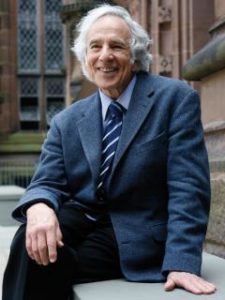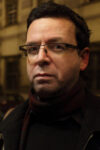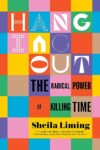 What follows is a lightly edited text based on a freewheeling conversation that took place at Princeton on a February afternoon. The occasion for the conversation was the publication of Walter Kaufmann: Philosopher, Humanist, Heretic, a critical, weighty appreciation (metaphorically and physically, totaling 760 pages) of the man who is almost singlehandedly responsible for introducing Nietzsche to a skeptical American audience in the post-war period. For many a confused, intellectually provincial undergrad like myself, Kaufmann cleared the pathway to philosophy, to European Thinkers, through his collections of existentialist texts or his translations of Nietzsche. However, for such an important figure for generations of students and free thinkers, little attention is paid to Kaufmann himself. Stanley Corngold, Professor Emeritus of German and Comparative Literature, has set out to correct this and place Kaufmann, his former Princeton colleague, in the full scope of a 20th century life, with all of its adventurism, contradictions, and tragedy.
What follows is a lightly edited text based on a freewheeling conversation that took place at Princeton on a February afternoon. The occasion for the conversation was the publication of Walter Kaufmann: Philosopher, Humanist, Heretic, a critical, weighty appreciation (metaphorically and physically, totaling 760 pages) of the man who is almost singlehandedly responsible for introducing Nietzsche to a skeptical American audience in the post-war period. For many a confused, intellectually provincial undergrad like myself, Kaufmann cleared the pathway to philosophy, to European Thinkers, through his collections of existentialist texts or his translations of Nietzsche. However, for such an important figure for generations of students and free thinkers, little attention is paid to Kaufmann himself. Stanley Corngold, Professor Emeritus of German and Comparative Literature, has set out to correct this and place Kaufmann, his former Princeton colleague, in the full scope of a 20th century life, with all of its adventurism, contradictions, and tragedy.
Michael Schapira: You’ve talked elsewhere about the origins of the project, being asked to write the introduction to a new edition of The Faith of a Heretic that was being published by Princeton University Press. You also write in the book about your first introductions to Kaufmann, both in his writing when you were reading his Nietzsche book on the deck of a navy ship, and in person when he came to lecture at Columbia during your undergrad days. But shifting into a more biographical register, can you say more about how people of your generation – when you were a student and shortly thereafter – would have seen Kaufmann. What kind of figure would he have cut in the university or in the broader public sphere?
Stanley Corngold: I’ll start with my own experience and hope that it will have some general value. When I was an undergraduate at Columbia between 1951-1955, there was little talk of Kaufmann. It’s a shame because his Nietzsche book of 1950 was a breakthrough. Our heroes were Lionel Trilling, Quentin Anderson, and the Partisan Review crowd. Kaufmann had an only very elliptical relationship to the Partisan Review crowd. I mentioned that he appeared at Columbia in the summer of 1955 and, as I recall, in lederhosen. He was not a towering figure. As I said in the book, he looked so much like an undergraduate that it was hard to lend him the credibility that we gave to Lionel Trilling.
The people I knew – and myself – didn’t want to be scholars, we wanted to write the Great American Novel. And that meant experience. The notion of going to graduate school was remote. That would be fine if you wanted to be a lawyer or a dentist, but we majored in English and wanted to go out into the great world. So Kaufmann as a scholar wasn’t in our range at the time.
After college I was in the army in Germany and became interested in the German language and the fate of the famous German Jewish scholars. I spent those years gathering experience for the Great American Novel, but it didn’t amount to a lot. I had 600 pages, which I sent to a publisher, and he came back almost the next day with the comment: “Why don’t you cast your net out a bit wider?” I didn’t know enough to write a big novel.
After the Army, I taught for the University of Maryland in Europe, which had the job of raising the academic level of the officer class. There were American officers who’d received their commission on the battlefield, but they did not have bachelor’s degrees, and if we were going to be a presence in Europe – as we were, with camps from Reykjavik to Ankara – our officers had better be cultivated. A whole generation of American scholars cut their teeth on the University of Maryland program, which would allow them to stay in Europe. And back at that time we were crazy about Europe. That’s where you wanted to go if you wanted real experience. 1955 at home had been full of anti-Communist ranting, and the general culture was complacent, conservative, business-bound, and flaccid.
In those years—the late 50’s—I wanted to stay in Europe and did for several years until Sputnik provoked the National Defense Education Act. This brought about a Congress-backed program of appropriations to certain university departments, meaning to build up the technical plant so that we could beat the Russians in the space race, but also on the view that there should be programs in Comparative Literature, since there you could psyche out the sensibilities of the Axis of Evil. You could learn Chinese and Russian. That led to a lot of changes. It brought women to Princeton, for example. At that point I came to Cornell on an NDEA grant to study with Paul de Man, which is hugely ironical because de Man brought deconstruction to America. Did Congress know that as a result of Sputnik we were going to have a deconstruction-mad America? Though it can be argued that deconstruction helped bring down the Berlin Wall [with irony, MS], since the logic of deconstruction is one that refutes bipolar oppositions, and so, since what’s not right cannot be, how can you have a wall separating East and West Germany?
After studying with de Man I got the job at Princeton and started to become aware of Walter Kaufmann’s eminence here. I was precepting for a course that asked for a lecture on Nietzsche. I turned to Kaufmann’s book but found it a bit trite and full of truisms. Of course, that’s the result of his teaching having already percolated through the culture. Instead, I introduced DeManian notions of the eternal suspension of belief in final propositions, the “vertiginous undecidability” of certain passages in Nietzsche—the whole deconstructionist routine. I was simply on a different track from Kaufmann at that time.
I later taught a course called “The Romantic Quest.” We read Faust. Kaufmann’s translation seemed excellent. His introduction was very useful but not exciting for those who had been studying literature with deconstructionist critics. So my relation to him was very casual at that time.
As I told you, he came into focus when I was aware that most of the deconstructive critics, against whose work I was beginning to turn, were dependent on his translations. And when he died suddenly in 1980 it struck me that he had been underappreciated. When asked, many decades later, to write a preface for one of his books, I did the research, and I found him interesting, and his work quite rich, and thought, maybe there’s a book here.
It’s funny that you mentioned the army, because I actually had a question prepared about this. The military is a big part of Kaufmann’s story as well, as he had this complicated experience of going back to Germany as an American soldier, in addition to its being where he first encounters Nietzsche’s work. But I was thinking more broadly about the role the military played for a generation of scholars. Last week I taught John Rawls, who served in the Pacific theater, which may have shaped some of his thought, and I’ve talked to philosophers like Robert Paul Wolff who also served. Do you think it’s anything more than a shared generational context, or might there be something particular about a generation of scholars having this close proximity to the military?
Of course, many literally fought in the war. Paul Fussell became a very important scholar of 18th century English literature and a scholar of American mores and class habits. He could be a brilliant, essayistic sociologist, with a marvelous style, and I’ve always been very impressed by a daring essay of his called “Thank God for the Atom Bomb.” He pointed out that the slaughter of Americans that would have followed an invasion of Japan would be appalling. He had seen men of his generation die in the Battle of the Bulge, and he just wasn’t willing to contemplate another invasion of another country killing literally thousands more Americans. In a lesser key, he also wrote that people who bother the world by putting out their books had no right to complain when their books were excoriated and they should just get to work on another book in that case. Tough-minded.
He’s older than I. By a series of accidents, I had been made enthusiastic about becoming a naval officer. It gave me the opportunity to live at Columbia away from my home in Brooklyn. I could be wild at Columbia on my own. It gets kind of complicated, the mentality of the time that drew certain adolescents to the military. Mine was at least linked [with irony, MS] to a desire for athleticism and fame, the kinds of persons shown in Life magazine, people who jumped out of airplanes or movie stars—a classic case of mediated desire. I was Jewish, mostly unconsciously so, and did not plan to be a scholar of the Talmud. I wanted to be a writer—a famous writer, of course. I was passionate about Saul Bellow’s The Adventures of Augie March. We read Hemingway, and we were really nuts about Europe—or being anywhere out of this world. We wanted to be elsewhere, where experience was rich and complex.
That is when I started to hear about Heidegger and Husserl, when, after my misbegotten tour of duty with the NROTC, I was stationed in Germany as an army corporal. But, to return to your question, of course, a decade earlier, there was the GI Bill that brought a lot of veterans into universities who had been in the brutal part of the war. It made them want to study and produced a lot of very smart people in the late 40s and early 50s.
That would be a tremendous project, to look at the war experiences of the leading critics of the 1940s and 1950s. New Criticism might be a kind of new concreteness, like the German movement Neue Sachlichkeit or the phenomenologists’ “To the things themselves,” in this case “To the words themselves.” A hard-bitten worldview. Think of Hemingway’s’ statement in A Farewell to Arms, “Abstract words such as glory, honor, courage, or hallow were obscene beside the concrete names of villages, the numbers of roads, the names of rivers, the numbers of regiments and the dates.”
De Man would be an exemplary case of someone who had been through the war in a certain way. His followers simply say, all his work represents a repudiation of the ideology with which he was fascinated as a young man, because wartime is a time of ideologies over the heads of those actually fighting. Some cared about concrete places, but mostly it was about “making the world safe for democracy.” People say that deconstruction is radically libertarian and anti-ideological, but I perversely, cultivating a maverick side, wrote a longish essay that no one ever read, pointing out how much totalitarian language there is in de Man’s writing. How much unnecessary violence there is. You can say that all ideology is violent because it brooks no contradiction, but there are strange formulations in de Man like, “Deconstruction is totalitarian.” I just found language that you might call fascistic, he not being a fascist.
Someone wrote a very clever little novel about a de Man figure, where the death of the author becomes a murder mystery. There’s a fabulous quote in it. Here it is, from which I got the title of a book of mine about Kafka.
The English critic Gilbert Adair has written a novel called The Death of the Author, a mystery that cleverly plays on the literary-critical thesis that modern writing implies the death of the empirical self of the author, his needs and personal interests, and introduces a character who is a parody of Paul de Man. Yet it is with a good deal of acuity that Adair puts these words in his hero’s mouth. “There could be no doubt, I repeat, about my opposition to the Nazi movement. Nevertheless, detectable in my discourse there remains the lambent traces, the still flickering embers of an occult and certainly unconscious attachment to the very codes and practices of the ideology I claim to oppose.”
There are a few aspects of Kaufmann’s biography that I found interesting. His origins are in one sense quite peculiar – converting at a young age to Judaism in Germany in the 1930s, for example. On the other hand his upbringing is familiar because it’s the Bildungsbürgertum class formation that would have been shared by many of the other émigrés who came here and ended up teaching at universities. I was thinking of the great Fritz Ringer book The Decline of the German Mandarins, and Kaufmann is a generation behind those scholars, but they share that mandarin mentality. How have you thought about Kaufmann as typical of a generation of German émigré scholars, and how his particularities cut against that?
At times in the book, mostly through the suggestions of Martin Jay, who enriched the book with his wisdom and knowledge, I link Kaufmann to other émigrés. But the émigrés we study the most now were about a half a generation or a full generation older than he. What you have here–you can detect this in small passages throughout Kaufmann’s work–is a filial resistance to them. He puts them down–Benjamin, Adorno, Heidegger (though of course not an émigré), Arendt–always a critical word for each of them. Partly I think because he didn’t like their German and English, which was mandarin and obscure. Kaufmann has this special trait of insisting on absolute clarity. His writing is crystal clear. His first resistance to Paul de Man maybe comes under this category, he found de Man simply unreadable. On the other hand, critics might say there is no soul there, or depth or obscurity, in Kaufmann’s work.
For years he admired English writers in the analytical tradition. He took them seriously, and then he decided when everyone was now converting to analytical philosophy that he had to be different. He was a born maverick. The big question about his career is that some of his independence is admirable, and some of it is simply a flagrant attempt to be different, to do projects that are a bit senseless – like promoting EST and promoting Reverend Moon by dint of participation in Moon’s conference.
I know that temptation. I’m comparing very small things to things quite great. But if you’ve had a rocky start you know the temptation. I got into trouble at Columbia with the NROTC, I got into trouble in the army by disobedience. My social behavior left a lot to be desired, having no proper education about…prudence. When you’ve had that rocky relationship with authority and convention, you become a bit addicted to it. And if you find yourself in a position of power, let’s say having a tenured position, you like to show that you are still at odds. Some of that rocky relation to authority persists [with irony, MS], even if it just comes down to provoking people.
This makes me think about Richard Rorty, who would have been Kaufmann’s colleague for a bit and also shared some of that spirit. Rorty ends his career in a Comparative Literature department. He’s out of philosophy after Princeton. I wonder if Kaufmann would have had a similar trajectory. He didn’t seem particularly interested in defining the field of academic philosophy in America.
I think that’s very shrewd. He might have got a job somewhere else as a “university professor” with free access to the libraries, but no affiliation to Philosophy.
Curiously, though, I just had a conversation with Gilbert Harman, who is a serious analytical philosopher. There was a time when he suggested that some elements in the department wished to establish a certain agreement among all its members that Walter might be happier elsewhere. Here I only speculate that the basis of this was that he had gotten offers. He was not going to be fired, but he might have been encouraged to go. But Tom Nagel and Gilbert Harman said, “Oh no. We like having him as something non-analytic in the department.”
You were talking about Kaufmann’s resistance to engaging the Frankfurt School émigrés. Another absence is a serious engagement with American philosophy and the American philosophical tradition. He just didn’t seem that interested in it. Horkheimer wrote Eclipse of Reason where he goes right at Dewey, and the Frankfurt School scholars try to settle an account, albeit in a highly critical and negative way, with American philosophy. This is a noticeable omission in Kaufmann’s work.
In my book I mention a scholarly article that says there is a proper pragmatic strand in Kaufmann’s thinking. That he is far closer to Dewey than he is to Heidegger, though that’s easy to say. On the face of it, Kaufmann doesn’t talk much about American philosophy. He’d rather read American literature than philosophy. There is a lot about Styron, and even some gonzo journalism that Kaufmann makes a lot out of. One reader cautioned me, saying, “You’ve adopted Kaufmann’s bad habit of including everything you happen to be reading that day.” Well, I’d like to claim that I didn’t include everything since [with irony, MS] I was often on the web. But sometimes I was lucky, and what I was reading I thought really enriched the Kaufmann topic of the day.
I definitely see that in the book. Whether you call it a bad habit or not is a different issue.
Good. Suddenly you say to Kaufmann, “What, how did the Marquis de Sade suddenly get into this discussion?” There’s another way to get these divagations, perhaps. When you are writing your books, and you’ve already done quite a lot, and you go to someone’s library and start flipping through the pages, you immediately see things that you can include. So the temptation is great.
Kaufmann always had something else to read. And even during big, serious projects like Tragedy and Philosophy, when he was immersed in classical scholarship, there was always Faulkner and Churchill and William Styron. It’s the same with the later works, when he went back again to the pillars of modern Western thought–to the Western Philosophical Tradition. They are all Germans in his big Discovering the Mind trilogy at the end. But you suddenly get Stalin or D.H. Lawrence or The Book of EST.
You mentioned Rawls. Kaufmann did have a big quarrel with Rawls, in response to whom he wrote a book against “the decrepit concepts” of guilt and justice. That is a point when people began not to show him the great respect that he had received till then.
There may be something to the critic’s point that Kaufmann’s work might not be good enough to sustain the enterprise all the way through. There really does seem to be a diminution in the later works – he’s a lot sloppier, less persuasive, and polemical in an unproductive way.
I agree. You can quote me as saying what you just said. Martin Jay has that great quote about Kaufmann’s “crying in the proverbial wilderness.” There’s especially his deep resistance to what was happening in Paris at the time. He was not going to read Derrida and Foucault.
His praise of Solzhenitsyn shows he definitely did seem to fall to one side of the student movements and subsequent culture wars and was not engaged by them.
John Smith, a scholar who teaches at Irvine, told me that he took a course with Kaufmann at the very end, in ‘79 or ‘80, and he was often ranting about all of these people who were “destroying the humanities.” Smith said that the students left and left until there were just two or three people in his office, where Kaufmann just read aloud from Discovering the Mind. He didn’t want to talk about what was going on. While it is very sad that he died at 59, I’m not sure about the work that would have followed.
You two were both formed as close readers, but in different ways. You were taught in the de Man School, while he learned close reading habits in the pursuit of potentially becoming a Rabbi. By the nature of this project you are reading over his shoulder quite a bit. Given how different your trainings were, what was the experience of reengaging in a process of close reading with someone whose habits would have been very different from yours?
We’re basically at odds, because we understand different things by close reading. He’s anti-New Criticism. De Man, mostly slyly, asked why people were so amazed by his work; it was just derivative of the New Criticism. Reuben Brower at Harvard taught a course–de Man was part of it–and they warned about the interpretation of poems: None of this humanistic cant! If you make a statement about a poem, make sure there is precise evidence for it. De Man was an inspired close reader–except when he wasn’t and had a perverse reading to sell you. Kaufmann complained about all of this close reading that was based on “snippets” of the work. But you can’t close-read a work of Dostoyevsky top to bottom. Of course, you are going to be looking at small passages and claim that they are crucial.
Kaufmann had nothing in common with post-structuralist close reading. He is not consistent in his aesthetics, as I try to point out; he hasn’t really done the work. His main drift is that men – I was about to say men and women, but he rarely talks about women – experience the world, and they put this experience in their work. And this is the experience of life that you recover as a reader. That is what de Man called humanistic cant. When I was studying with de Man at graduate school and espoused this idea, he called it “an engaging aberration.” At other times Kaufmann would say that experiences are constituted by the work and that he was looking at “experience both outside and inside the work.” Then at other times it’s all back outside the work–the experience in and of the poem has to originate elsewhere. That is Kaufmann’s maverick side wanting to say, “I’m not interested in being a lilywhite ivory tower professor. I want you to know that my critical work and thinking comes out of my experience of life,” and I will project this view onto all writers. Otherwise, why bother to read? It would all be just wordplay. Thus Kaufmann.
This leads me to my last question, which I have to ask if I’m talking to an eminent scholar. It’s about the future of the humanities. You seem very unimpressed by Kaufmann’s book on this subject. The conversation around this topic has gotten very stale, while remaining urgent. There is a problem of alignment between the affect and the content of the discourse. That humanistic cant seems to hold the day. The question is, if you aren’t satisfied by Kaufmann’s intervention, do you have any other thinkers that you find more persuasive on this topic?
Yes, I do. I happen to be writing a lot at the moment about Thomas Mann in Princeton in the years 1938-1941. He was in heady relation with a number of great humanist scholars—with Erich Kahler, with Hermann Broch, who wrote The Death of Vergil while living in Kahler’s attic, and then the good friend of Kahler and Broch (less so of Mann)—Albert Einstein. If you read their correspondence, of course mostly in German, you encounter a language of sensibility of the most subtle and refined sort—a humanism on display in the beauty and subtlety of the language in which they defend humanist ideas. Humanism might be summed up in a pamphlet to which Mann and Kahler and Broch contributed called The City of Man. It is well worth reading, and it’s in English. Have a look at the texture of the language, at the urgency of the thought, at the wealth of knowledge of history and political philosophy—and see what a humanist’s mind might amount to. I admit that this was a humanism that was facing off against Nazi-fascism. We have a few vicious types in office here and around the world, but so far they don’t seem to be capable of crushing, on a worldwide scale, humanists and humanist thought. If and should things get worse, humanism will take on a new force in an inspired language, but until America went to war with Germany, “democracy,” for them another word for humanism, was an enfeebled idea. It’s a pity that we must wait for things to get worse before they can get better.
Michael Schapira is an Interviews editor at Full Stop and teaches Philosophy at St. Joseph’s University.
This post may contain affiliate links.







